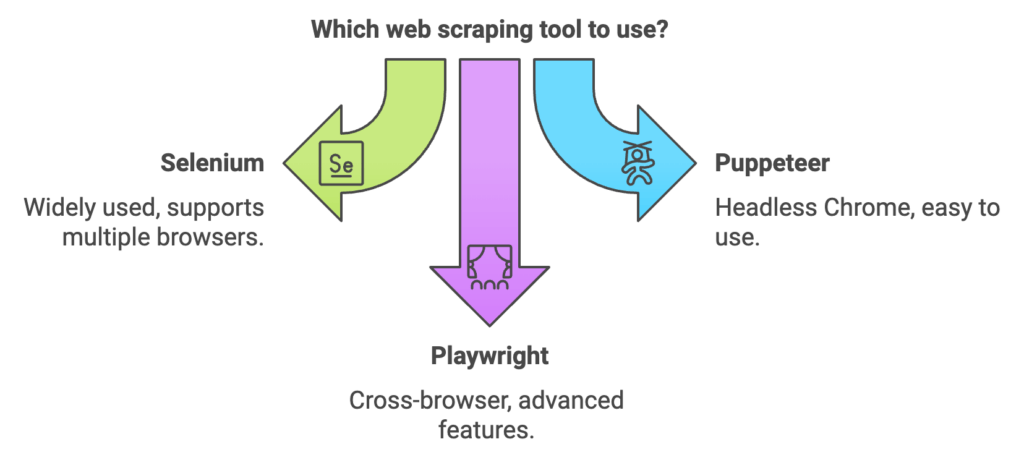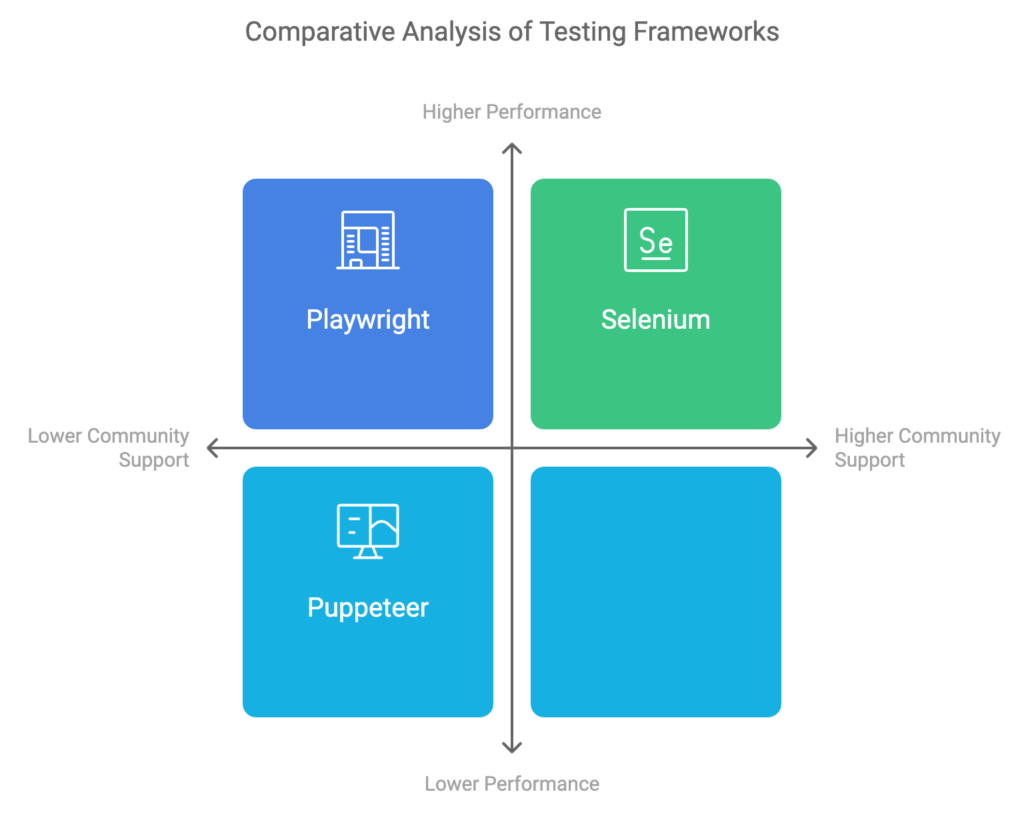Web scraping is an essential technique for extracting data from websites, and tools like Selenium, Puppeteer, and Playwright have become instrumental in this process. These tools enable developers to automate browser actions, mimic human behavior, and extract data efficiently. Let’s delve into what these tools are and how they are used in web scraping.

Selenium – The Veteran of Web Automation
Overview
Selenium is an open-source tool primarily known for automating web browsers. It supports multiple programming languages and browsers, making it versatile for web testing and scraping.
Features
- Browser Automation: Selenium can automate browsers to perform actions like clicking buttons, filling forms, and navigating pages.
- Multi-browser Support: It supports multiple browsers such as Chrome, Firefox, and Edge.
- Language Bindings: Selenium provides bindings for various programming languages, including Python, Java, C#, and Ruby.
Web Scraping Use Cases
- Dynamic Content Scraping: Selenium is effective for scraping websites with dynamic content that loads via JavaScript.
- Handling CAPTCHA and Authentication: It can automate interactions with CAPTCHA and login forms, although this might require additional services.
Puppeteer – Google’s Headless Chrome API
Overview
Puppeteer is a Node.js library developed by Google to control headless Chrome or Chromium. It’s designed for browser automation, web scraping, and creating screenshots or PDFs of web pages.
Features
- Headless Browser Control: Puppeteer operates in headless mode by default, meaning it runs Chrome without a user interface, which is ideal for background scraping tasks.
- Powerful API: It offers a comprehensive API for managing browser instances, generating screenshots, and generating PDFs.
- JavaScript Execution: Puppeteer can execute JavaScript within the browser context, making it suitable for scraping dynamic content.
Web Scraping Use Cases
- JavaScript-heavy Websites: Puppeteer excels at scraping websites that rely heavily on JavaScript for content rendering.
- Stealth Scraping: It can be configured to mimic human behavior closely, reducing the chances of detection by anti-bot systems.
Playwright – Microsoft’s Modern Web Automation
Overview
Playwright, developed by Microsoft, is a newer tool designed for end-to-end testing and web scraping. It supports multiple browsers (Chromium, Firefox, WebKit) with a single API, ensuring cross-browser compatibility.
Features
- Cross-browser Support: Unlike Puppeteer, which is limited to Chrome, Playwright supports multiple browsers, providing more flexibility.
- Auto-wait Functionality: Playwright automatically waits for elements to be actionable, reducing the need for explicit waits and improving script reliability.
- Mobile Emulation: It supports mobile device emulation, allowing developers to scrape mobile versions of websites.
Web Scraping Use Cases
- Cross-browser Testing and Scraping: Playwright’s ability to handle multiple browsers makes it versatile for scraping different website versions.
- Complex Workflows: It can manage complex scraping tasks involving multiple pages and interactions, thanks to its robust API.
Comparative Analysis:

- Performance: Playwright often outperforms Selenium in terms of speed and resource efficiency due to its modern architecture.
- Browser Support: Selenium supports a wider range of browsers out-of-the-box, while Puppeteer and Playwright focus on fewer but more modern browsers.
- Community and Ecosystem: Selenium has a larger community and more mature ecosystem, which can be beneficial for finding solutions and plugins.
- Learning Curve: Puppeteer and Playwright might be easier for those familiar with JavaScript, while Selenium’s support for multiple languages can be both an advantage and a complexity.
Best Practices
- Randomization: Incorporate random delays and actions to mimic human behavior and avoid detection.
- Proxy Management: Use proxies and IP rotation to prevent IP blocking.
- Ethical Scraping: Always adhere to website terms of service and legal guidelines to ensure ethical scraping practices.
Conclusion
Selenium, Puppeteer, and Playwright each bring unique strengths to the table for web scraping tasks. By understanding their features and use cases, developers can choose the right tool for their specific needs and implement effective, ethical scraping strategies.